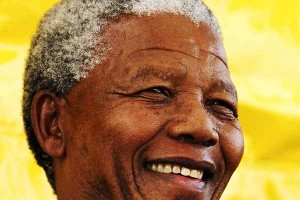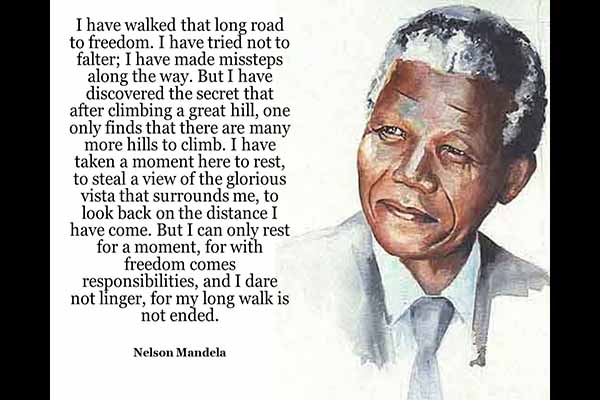
“Do not judge me by my successes, judge me by how many times I fell down and got back up again.” Nelson Mandela
Sadly, Nelson Mandela has died. The good part is that he led a life that was not only long, but also highly remarkable. He was a major factor in the end of apartheid, and replacing that with a South African democracy that includes both Whites and Blacks. Despite the tremendous opposition to this he experienced by the Whites who thought the government and rights were all theirs, Mandela did not just insist on putting them down. Rather, he reached out to them, tried to recognize their sense that the country was theirs, and encouraged everyone involved to work hard on being a real democracy. He also tried to help the Blacks see that constructive, rather than angry interactions with the Whites was most likely to produce mutually beneficial results.
Indeed, Mandela is a fine example of someone high in personality Hardiness, which is the pattern of attitudes and strategies that help people learn from stressful circumstances and do better in that process. He has shown all three of the HardiAttitudes.
As to Commitment, he never let himself back off from people and circumstances, even when their reactions to what he represented was very stressful to him. In this, he insisted on trying to understand and love the Whites who saw him as an enemy, and the Blacks who thought he was too concerned with being approving of by what they saw as enemies. Staying involved was obviously very important to him.
As to Control, he wanted to have an influence on outcomes, even when that meant involving himself in very stressful circumstances. Indeed, even when he was put in jail for trying to help in ending apartheid, Mandela kept trying to be in touch constructively with Whites. For example, he tried to be friendly with a prison guard, by sharing experiences with him. That guard finally helped Mandela be visited by his family members, even though this was against the prison rules. And, the guard also helped Mandela learn the language that eventually permitted him to interact strongly with other prisoners.
And, in all this, he was also very strong in the Challenge attitude, which led him to see life’s inevitable stresses as an opportunity to grow and develop through what is learned by trying to deal with the stressful problems. Indeed, he was quoted as saying “Do not judge me by my successes, judge me by how many times I fell down and got back up again.” (Goodreads.com)
Mandela’s HardiAttitudes provided him with the courage and motivation to do the hard work of actually turning his stressful circumstances from disasters into growth opportunities instead. In this hard work, he was always into Problem-Solving Coping (rather than avoidance), Socially-Supportive Interactions with others (rather than conflicting), and Beneficial Self-Care (rather than careless over-indulgence).
In all this, his initial efforts to overcome apartheid, and make South Africa a country for equal status and possibilities for all, led to him to be put in prison for 27 years for what was described as trying to overcome the government by force. Indeed, in this period, the US even considered him a terrorist. However, it appeared to many people around the world that he was just trying to get equality for all the people in this country. US President Bush finally decided to remove Mandela from the terrorist status. In all this, Mandela agreed that he had flaws, but insisted that he was just trying to improve the country, and tried to make clear that he did not support civil disobedience.
While in jail, his development of friendships with the prison guard and fellow prisoners mentioned before is an example of his emphasis on problem-solving coping and socially-supportive interactions. Also, he was finally released from prison. At that point, he was elected President by the new democratic process he had helped form in South Africa. As President, he openly tried very hard to understand and support everyone. He reacted with appreciation, even when others expressed hatred for him. He insisted that freedom and equality for all was of great importance. Along the way, he actually received the Nobel Peace Prize.
In his lifetime, we have seen how a high level of Hardiness can help even with stressful circumstances that are especially based on an insistence that one group of people is much better, and should continue to be more powerful, than is another group, even if the two groups live in the same place. Mandela had the courage to grow from stressful circumstances that helped his country with significant development toward freedom and equality.
If you liked my post today, please let me know by selecting the Like icon that immediately follows. You can also Tweet and Google+1 today’s article to let your friends know about it. Regards, Salvatore R. Maddi
Note: You can find out more about the hardiness approach to turning adversity into an opportunity for new learning and growth at www.hardinessinstitute.com







Dear Dr. Maddi,
While I am not extremely familiar with the Hardiness traits, I found your article to be a very informative and enriching read. Mr. Mandela was an incredible leader and definitely had a unique perspective as he navigated through life’s challenges. Thank you. And Merry Christmas.
Regards,
Manju
Thanks for your liking my article, Manju. I would be happy to provide you with more info about hardiness, which is the personality pattern of attitudes and strategies that together help you turn stressful circumstances from potential disasters into growth opportunities. Let me know if you want this.
Cheers, Sal Maddei
Indeed, it was a nice article . The aspects of hardiness and circumstances are very effectively prescribed . In this article , i found that this article is mostly based on solving problems in such periods when the man needs to think positively instead of unthinkable things . Secondly , the freedom and equality are also one of the main ingredients which can create smoothness and positiveness in the mind of that person who deals with such social , economical , political and equality circumstances .
Thank you so much for your positive reaction.
wel come Salvatore Maddi 🙂